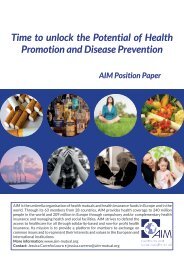Exploring patient participation in reducing health-care-related safety risks
Exploring patient participation in reducing health-care-related safety risks
Exploring patient participation in reducing health-care-related safety risks
Create successful ePaper yourself
Turn your PDF publications into a flip-book with our unique Google optimized e-Paper software.
Patient <strong>safety</strong>, rights and medication <strong>safety</strong> <strong>in</strong> primary <strong>care</strong> <strong>in</strong> Poland<br />
Report from the RCMADR <strong>in</strong> Kraków (1 January 2004–31 December 2010)<br />
The analysis covers ADRs reported to the regional centre <strong>in</strong> Kraków from 1 January<br />
2004 to 31 December 2010. The total number of reports was 2619. Detailed analysis of<br />
these <strong>in</strong>cluded ADRs that resulted from the follow<strong>in</strong>g (Table 5.1):<br />
» drug <strong>in</strong>teractions <strong>in</strong> polypharmacotherapy;<br />
» medic<strong>in</strong>es–dietary supplement <strong>in</strong>teractions;<br />
» OTC drugs and prescribed medic<strong>in</strong>e <strong>in</strong>teractions; and<br />
» medication errors: prescrib<strong>in</strong>g/adm<strong>in</strong>ister<strong>in</strong>g a medication with contra<strong>in</strong>dications<br />
or exist<strong>in</strong>g limitations.<br />
Table 5 .1 . Number of ADRs reported per year per category, 2004–2010<br />
Year Drug<br />
<strong>in</strong>teractions <strong>in</strong><br />
polypharmacotherapy<br />
Dietary<br />
supplements<br />
<strong>in</strong>teractions<br />
OTC drugs<br />
and prescribed<br />
medic<strong>in</strong>es<br />
<strong>in</strong>teractions<br />
Medication<br />
errors<br />
% of reports <strong>in</strong><br />
relation to all<br />
reports sent <strong>in</strong> a<br />
given year<br />
2004 42 1 18 16 68.14<br />
2005 89 2 26 25 60.68<br />
2006 118 3 41 46 74.82<br />
2007 186 4 48 68 79.48<br />
2008 295 10 62 82 82.99<br />
2009 276 12 73 91 87.25<br />
2010 295 28 62 104 88.90<br />
Source: authors’ own compilation based on data collected by the RCMADR.<br />
Analysis of the ADRs confirms a cont<strong>in</strong>uous <strong>in</strong>crease result<strong>in</strong>g from the numerous<br />
pathologies <strong>in</strong> pharmacotherapy. This observation stems from the grow<strong>in</strong>g practice<br />
of polypharmacotherapy not preceded by rational risk assessment oriented towards<br />
potential ADRs. In addition, the Polish <strong>health</strong> <strong>care</strong> system does not provide an<br />
objective and reliable source of <strong>patient</strong> medic<strong>in</strong>e <strong>in</strong>formation, and treatment is usually<br />
provided by different providers at primary and specialist <strong>care</strong> levels. These professionals<br />
have no established practice for consult<strong>in</strong>g the literature on medic<strong>in</strong>es and often have<br />
little knowledge of the characteristics of medic<strong>in</strong>es prescribed by another specialist.<br />
This makes the prevention of drug <strong>in</strong>teractions and ADRs an impossible challenge <strong>in</strong><br />
<strong>patient</strong>s who are subject to collaborative medication treatment.<br />
Patient medication <strong>safety</strong> is also compromised by the <strong>in</strong>creased use of dietary<br />
supplements that are susceptible to <strong>in</strong>teractions, with no research cover<strong>in</strong>g the risk of<br />
<strong>in</strong>teraction. The <strong>safety</strong> of dietary supplements is not monitored <strong>in</strong> Poland, mak<strong>in</strong>g it<br />
difficult to obta<strong>in</strong> an objective op<strong>in</strong>ion about the <strong>safety</strong> and <strong>risks</strong> of their <strong>in</strong>teractions.<br />
The number of ADRs due to <strong>in</strong>teractions between OTC drugs and prescribed medic<strong>in</strong>es<br />
is <strong>in</strong>creas<strong>in</strong>g. This might be <strong>related</strong> to low <strong>patient</strong> awareness of medic<strong>in</strong>es <strong>in</strong>teractions<br />
or may <strong>in</strong>dicate restricted access to competent sources of <strong>in</strong>formation on medic<strong>in</strong>es<br />
(physicians, pharmacists); it may also result from a lack of will<strong>in</strong>gness to read and<br />
understand <strong>patient</strong> <strong>in</strong>formation leaflets.<br />
87



